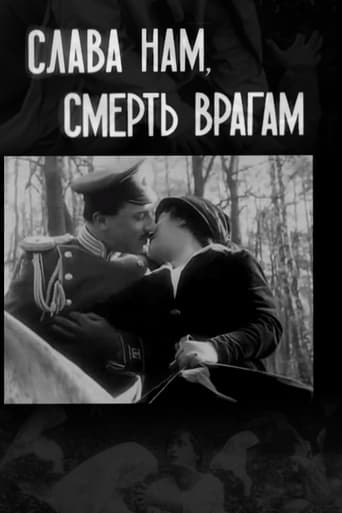Plustown
A lot of perfectly good film show their cards early, establish a unique premise and let the audience explore a topic at a leisurely pace, without much in terms of surprise. this film is not one of those films.
kekseksa
It is only in recent years that the films of Yevgeny Bauer have become readily available and their "discovery" has radically altered views about the history of cinema for anyone who is familiar with them. They show an absolute mastery of mise en scène and of camera-angling that not only make him one of the first authentic geniuses of the cinema but also help to explain the high quality of later Soviet film-making (Lev Kuleshov was Bauer's art director for his later films).This little war propaganda short (made in the same year as Child of the Big City and Mute Witnesses) is hardly known at all but is a beautiful little film which shows all Bauer's usual virtuosity. The title is sometimes rendered in English as "Glory to Us, Death to the Enemy" but most of the film treats this idea entirely ironically. The film concerns a young army bride whose husband has gone to the front and who herself decides to work as a nurse. Seen through her eyes, most of the film shows nothing but the terrible sadness of war and the suffering it causes. Only towards the end does it turn abruptly to melodrama but even the last few minutes of heroics are not without ambiguity. The nurse stabs and wounds a soldier who tries to rape her but then puts on his uniform so as to carry out herself the important mission with which he has been charged....No doubt many have asked themselves the question - why on earth did we not know about Bauer before. If you want to understand that, have a look at a much later Russian film, A Slave of Love/Raba Lyubvi (1976) by Nikita Mikhalkov. This is a biopic about the actress Vera Kholodnaya, who had worked with Bauer and other pre-revolutionary film-makers (Pyotr Chardynin, although a lesser talent than Bauer also produced two fine films, Woman of Tomorrow and Chrysanthemums in 1914). The argument of this film (and it was the "official" view that held sway through the Soviet period) is that these film-makers, based in the Crimea were living in a sort of cloud-cuckoo-land away from the civil war where the "real" film-makers were making propagandist documentaries in support of the freedom-struggle. So the 1976 film includes a grotesque parody of a Bauer film (clearly based on Bauer's 1915 film The Happiness of Eternal Night) which it represents quite falsely as some sort of burlesque comedy.Bauer died in 1917 so was never able to continue his career either inside or outside Russia (his contemporary Protazonov did both). As a result his films were more or less erased from the record and, rather shamefully, Kuleshov seems to have done nothing to keep the memory and reputation of his mentor alive. Yet the famous "Kuleshov" effect, properly understood is as much to do with acting styles (Bauer used famously to prevent his actors from "acting", much to their annoyance) and with mise en scène - that is to say, how you watch and what you watch - as it is to do with cutting and montage. There is an important continuity to be sketched between the work of Bauer and that of Pudovkin, Vertov, Eisenstein and Dovzhenko which will correctly identify Bauer as the outstanding pioneer of Russian film to whom all later film-makers are indebted.

